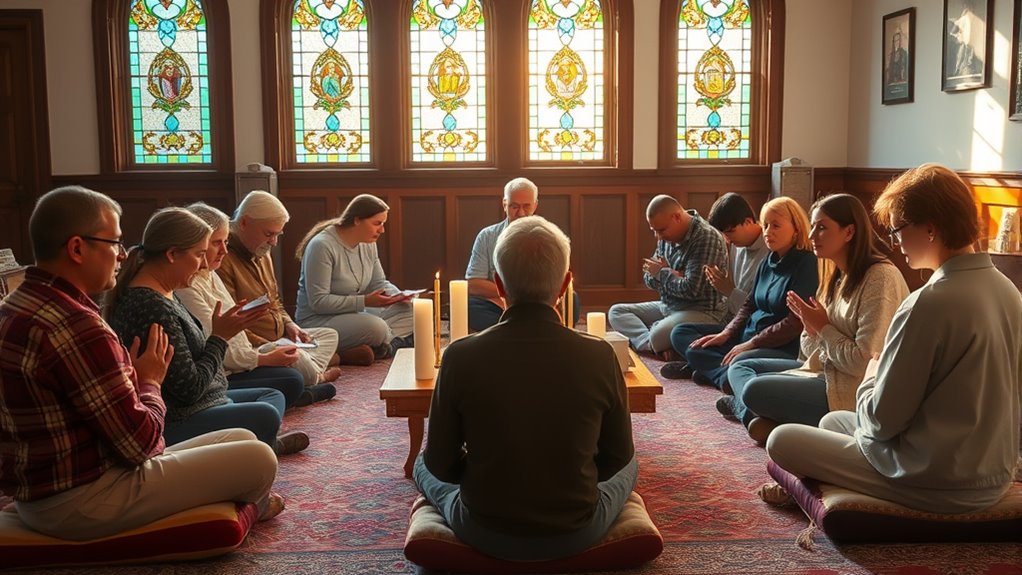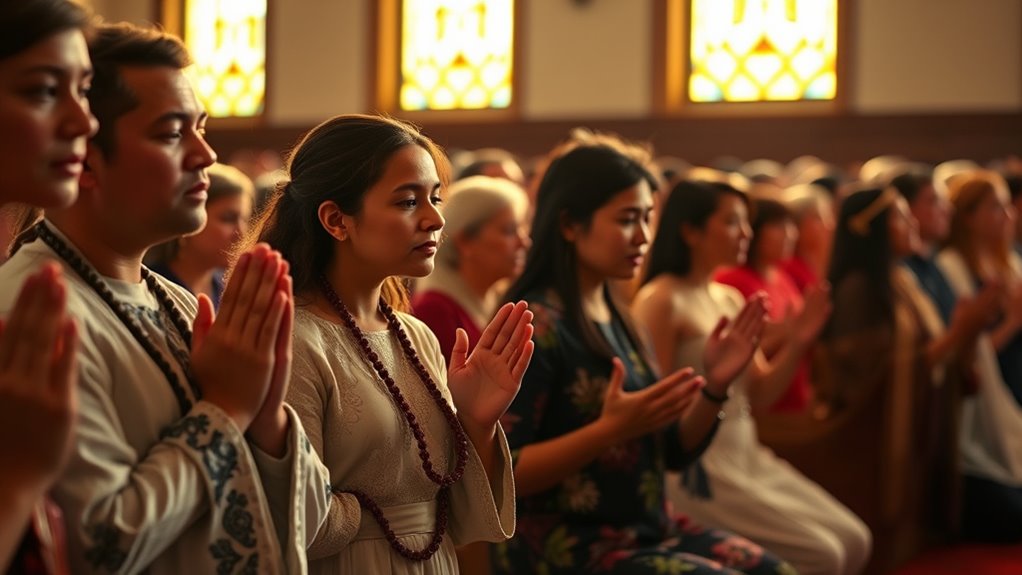Worship as a lifestyle means making your faith your daily focus, shaping every thought, action, and relationship around spiritual values. It’s about moving beyond rituals and embracing a mindset of gratitude, reverence, and purpose in everything you do. By intentionally aligning your choices with your faith, practicing mindfulness, and serving others, you turn worship into a continuous act of devotion. To discover how to live this way every day, keep exploring how to deepen your spiritual journey.
Key Takeaways
- Worship as a lifestyle involves integrating faith into daily actions, thoughts, and relationships beyond formal rituals.
- Cultivating gratitude and mindfulness daily transforms ordinary moments into acts of worship.
- Embodying reverence and respect in routine activities deepens spiritual authenticity.
- Living purposefully aligns choices with spiritual values, guiding meaningful and intentional living.
- Serving others and maintaining spiritual boundaries reflect faith in action, fostering ongoing spiritual growth.
Understanding Worship Beyond Rituals

While many people associate worship primarily with rituals or ceremonies, it actually extends far beyond these acts. Worship isn’t just about rituals; it’s a lifestyle, shaping how you live daily. You might see traditional worship as following set ceremonies, but personal worship is about making your faith a constant part of your life. This shift from ritual vs. lifestyle means your devotion isn’t confined to specific moments; it influences your choices and attitude every day. Traditional practices offer structure, but personal worship invites authenticity and intimacy. Embracing worship as a lifestyle transforms it from a scheduled event into a continuous act—whether through your actions, thoughts, or relationships—making faith a natural part of who you are.
Cultivating a Heart of Gratitude

Every day offers opportunities to express thanks, whether through words or actions. Recognizing the blessings around you helps shift your focus from what’s missing to what’s abundant. When you cultivate gratitude intentionally, worship becomes a natural reflection of your heart.
Expressing Daily Thanks
Cultivating a heart of gratitude begins with intentionally recognizing the blessings in your daily life. When you practice graceful gratitude, you turn ordinary moments into opportunities for everyday praise. Simple acts like thanking someone, acknowledging kindness, or whispering a quiet thanks to God can transform your perspective. By intentionally expressing thanks each day, you show appreciation for both big and small blessings. This habit helps you develop a genuine, thankful heart, making gratitude a natural part of your routine. Over time, your daily expressions of thanks cultivate a deeper awareness of God’s goodness and grace. Remember, consistent gratitude isn’t just about words; it’s about cultivating a mindset that recognizes and honors the everyday ways God blesses you.
Recognizing Life’s Blessings
Recognizing life’s blessings requires you to develop an attentive heart that notices God’s goodness in everyday moments. Practicing blessing recognition helps you see how God’s grace touches every aspect of your life. One effective way is gratitude journaling, where you record specific blessings each day. This habit shifts your focus from what’s lacking to what’s abundant. To deepen your gratitude, consider these steps:
- Make time daily to reflect on recent blessings.
- Write them down in a dedicated journal.
- Share your gratitude with others to reinforce appreciation.
- Remind yourself that recognizing small blessings cultivates a heart of gratitude.
Embodying Reverence in Daily Actions

You can embody reverence every day by choosing intentional practices that honor the sacred in ordinary moments. Treat others with genuine respect in every interaction, no matter where you are. Stay mindful of each task, bringing a sense of presence and purpose to everything you do.
Intentional Daily Practices
Integrating intentional daily practices into your routine transforms ordinary moments into opportunities for reverence. You can cultivate a sense of worship by bringing mindfulness to simple actions. For example:
- Practice mindful eating—savor each bite, appreciating the nourishment and effort behind your food.
- Dedicate time to intentional recreation—engage fully in activities that refresh your spirit.
- Pause briefly before starting tasks to set a purposeful, respectful intention.
- Incorporate short moments of gratitude, acknowledging the sacred in everyday experiences.
These small, deliberate actions help you embody reverence daily, turning routine moments into meaningful expressions of worship. Consistently practicing intentionality deepens your connection to the divine presence within and around you.
Respectful Interactions Everywhere
When you approach every interaction with respect, you embody reverence in daily life. Practicing hospitality etiquette and respectful communication creates a positive environment, whether with strangers or loved ones. Your tone, gestures, and attentiveness reflect your reverence and foster connection. To guide your interactions, consider this table:
| Situation | Behavior to Practice | Outcome |
|---|---|---|
| Meeting new people | Offer warm greetings and active listening | Builds trust and respect |
| Handling disagreements | Speak calmly, listen fully | Maintains harmony |
| Giving feedback | Be constructive and kind | Encourages growth |
| Everyday tasks | Show patience and gratitude | Cultivates humility and reverence |
Mindful Presence in Tasks
Practicing mindful presence in daily tasks transforms ordinary actions into acts of reverence. When you bring mindful awareness and focused attention to simple chores, you turn routine activities into meaningful worship. This shift helps you embody reverence in every moment, no matter how small. To cultivate this practice:
- Pause briefly before starting a task to set your intention.
- Focus fully on each step, avoiding distractions.
- Notice sensations, sounds, and movements with gentle awareness.
- Finish with gratitude, acknowledging the act as an offering.
Integrating Faith Into Relationships

To truly incorporate faith into your relationships, you need to intentionally prioritize spiritual principles in your daily interactions. Faithful communication is key; speak honestly, kindly, and with love, reflecting Christ’s example. Be mindful of setting spiritual boundaries that protect your relationship’s integrity and foster mutual respect. These boundaries help prevent misunderstandings and ensure your connection remains rooted in God’s principles. Incorporate prayer and scripture into your interactions, seeking guidance and wisdom. As you do, you’ll foster trust and deepen your bond, making your relationship an ongoing act of worship. Remember, integrating faith isn’t about perfection but consistency—letting God’s love shape your words, actions, and decisions every day. This intentional approach keeps your relationship aligned with your spiritual walk.
Navigating Challenges With Spiritual Perspective

Facing challenges in your life or relationships can feel overwhelming, but approaching them with a spiritual perspective allows you to find strength and clarity. Spiritual resilience helps you stay grounded and trust in a higher plan during tough times. To build faith-based resilience:
- Pray regularly to seek guidance and peace.
- Reflect on past victories to boost confidence.
- Stay connected with your faith community for support.
- Practice gratitude to shift focus from problems to blessings.
Serving Others as an Expression of Worship

When you view challenges through a spiritual lens, serving others naturally becomes an extension of your worship. By engaging in community outreach, you demonstrate love and compassion in tangible ways. Helping those in need isn’t just an act of kindness; it’s a reflection of your faith in action. Charitable giving becomes more than a donation—it’s a heartfelt offering that honors your spiritual beliefs. As you serve, you align your actions with your worship, recognizing that caring for others expresses gratitude to God. This lifestyle of service transforms daily routines into opportunities to embody Christ’s love, making your faith visible in practical, impactful ways. Serving others therefore becomes a powerful act of worship that deepens your spiritual journey and benefits your community.
Reflecting on Purpose and Intentional Living

Understanding your purpose is essential to living intentionally and aligning your daily actions with your spiritual values. Purposeful reflection helps you identify what truly matters, guiding your choices toward meaningful living. When you intentionally focus on your purpose, your actions become a reflection of your faith and values. To deepen this awareness, consider these steps:
- Regularly evaluate your goals and motivations.
- Identify habits that support or hinder your purpose.
- Practice gratitude to stay grounded in your spiritual journey.
- Adjust your actions to better align with your core beliefs.
Sustaining a Worship-Filled Mindset Daily

Maintaining a worship-filled mindset every day requires intentional effort and consistent focus. Start by cultivating daily gratitude; recognizing God’s blessings shifts your perspective and keeps your heart focused on Him. Practice mindful presence throughout your day—whether in work, conversations, or quiet moments—by intentionally acknowledging God’s presence in each activity. This awareness helps you stay connected and worshipful, even amid daily routines. Set aside specific times for prayer and reflection, reinforcing your commitment to live with a worshipful attitude. Remember, sustaining this mindset isn’t about perfection but persistence. By intentionally choosing gratitude and mindfulness, you create a continual atmosphere of worship that transforms everyday life into an ongoing act of devotion.
Frequently Asked Questions
How Can I Maintain Worship During Busy or Stressful Days?
When busy or stressed, you can maintain worship by trusting in grace in adversity to keep your faith strong. Incorporate short prayer routines throughout your day, like quick moments of gratitude or reflection. These small acts help you stay connected to God, even in chaos. Remember, consistent effort, no matter how small, sustains your spiritual life and keeps worship alive during life’s challenges.
What Are Practical Ways to Incorporate Worship Into Work Life?
Imagine your workday as a garden needing daily watering. You can incorporate worship by setting mini prayer routines during breaks, turning moments into opportunities for gratitude expressions. Whisper a quick prayer before meetings or pause to thank God for small wins. These simple acts act like nourishing rain, helping your spirit stay rooted and vibrant amid busy days. Consistently, they turn mundane work moments into sacred acts of worship.
How Does Worship Influence Decision-Making in Daily Life?
Worship shapes your decision-making by strengthening your moral compass and fostering a spiritual discipline. When you prioritize worship, you’re more likely to contemplate what aligns with your values and faith. It encourages you to pause, reflect, and seek guidance before acting. This mindful approach helps you make choices rooted in integrity and compassion, influencing your daily life positively and guiding you toward actions that honor your beliefs.
Can Worship Be Meaningful Without Attending Formal Services?
Imagine you’re walking alone at dawn, feeling a quiet connection. That moment shows worship can be meaningful without formal services. Your personal devotion and spiritual discipline deepen your faith, helping you find purpose and peace. Worship isn’t confined to a building; it’s about intentional acts and mindset. When you nurture these habits daily, your relationship with your faith grows stronger, making worship a continuous, heartfelt experience beyond traditional gatherings.
How Do Cultural Differences Shape Everyday Worship Practices?
Cultural differences deeply influence how you practice everyday worship, shaping your rituals and expressions. You might find that cultural expressions vary widely, from prayer styles to rituals around daily routines. These ritual variations reflect your cultural background and beliefs, making worship personal and meaningful. Embracing these differences allows you to connect more authentically with your faith, honoring your traditions while appreciating others’ unique approaches to spiritual practice.
Conclusion
When you make worship a way of life, it becomes second nature. By living with gratitude, reverence, and purpose, you turn everyday moments into opportunities to connect deeply with your faith. Remember, actions speak louder than words, so let your daily choices reflect your devotion. Keep your heart open and your mind focused—don’t let life’s challenges cause you to lose sight of what truly matters. Stay committed; it’s a journey worth taking.










